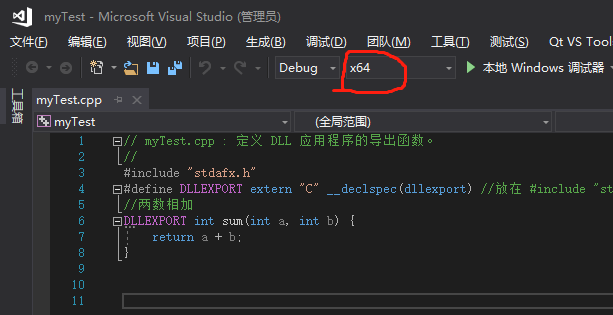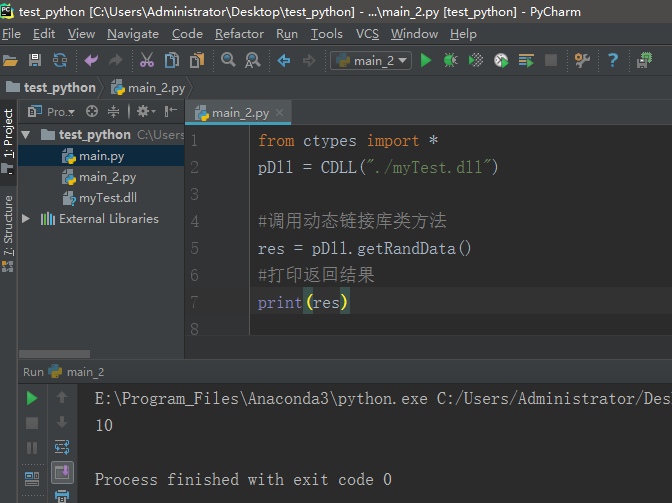您好,登錄后才能下訂單哦!
您好,登錄后才能下訂單哦!
python如何使用ctypes庫調用DLL動態鏈接庫?針對這個問題,這篇文章詳細介紹了相對應的分析和解答,希望可以幫助更多想解決這個問題的小伙伴找到更簡單易行的方法。
一、Python調用DLL里面的導出函數
1.VS生成dll
1.1 新建動態鏈接庫項目

1.2 在myTest.cpp中輸入以下內容:
// myTest.cpp : 定義 DLL 應用程序的導出函數。
//
#include "stdafx.h"
#define DLLEXPORT extern "C" __declspec(dllexport) //放在 #include "stdafx.h" 之后
//兩數相加
DLLEXPORT int sum(int a, int b) {
return a + b;
}注意:導出函數前面要加 extern "C" __declspec(dllexport) ,這是因為ctypes只能調用C函數。如果不用extern "C",構建后的動態鏈接庫沒有這些函數的符號表。采用C++的工程,導出的接口需要extern "C",這樣python中才能識別導出的函數。
1.3生成dll動態鏈接庫
因為我的python3是64位的,所以VS生成的dll要選擇64位的,如下所示:

點擊標題欄的 生成 -> 生成解決方案

1.4 查看生成的dll動態鏈接庫

2.Python導入dll動態鏈接庫
用python將動態鏈接庫導入,然后調用動態鏈接庫的函數。為此,新建main.py文件,輸入如下內容:
from ctypes import *
#----------以下四種加載DLL方式皆可—————————
# pDLL = WinDLL("./myTest.dll")
# pDll = windll.LoadLibrary("./myTest.dll")
# pDll = cdll.LoadLibrary("./myTest.dll")
pDll = CDLL("./myTest.dll")
#調用動態鏈接庫函數
res = pDll.sum(1,2)
#打印返回結果
print(res)運行結果如下所示:

二、Python調用DLL里面的實例方法更新全局變量值
1.VS生成dll
1.1 添加 mainClass 類,內容如下:
mainClass.h:
#pragma once
extern int dta;
class mainClass
{
public:
mainClass();
~mainClass();
void produceData();
};mainClass.cpp:
#include "stdafx.h"
#include "mainClass.h"
int dta = 0;
mainClass::mainClass()
{
}
mainClass::~mainClass()
{
}
void mainClass::produceData() {
dta = 10;
}1.2 更改 myTest.cpp 內容
myTest.cpp:
#include "stdafx.h"
#define DLLEXPORT extern "C" __declspec(dllexport) //放在 #include "stdafx.h" 之后
#include "mainClass.h"
//返回實例方法里面更新數據后的值
DLLEXPORT int getRandData() {
mainClass dataClass = mainClass();
dataClass.produceData();
return dta;
}1.3 生成64位dll
2.Python導入dll動態鏈接庫

明顯可以看出,在C++里設置的全局變量的值已經從0變為10了,說明python可以通過調用dll里面的實例方法來更新全局變量值
三、Python_ctypes 指定函數參數類型和返回類型
前面兩個例子C++動態鏈接庫導出函數的返回類型都是int型,而Python 默認函數的參數類型和返回類型為 int 型,所以Python 理所當然的 以為 dll導出函數返回了一個 int 類型的值。但是如果C++動態鏈接庫導出的函數返回類型不是int型,而是特定類型,就需要指定ctypes的函數返回類型 restype 。同樣,通過ctypes給函數傳遞參數時,參數類型默認為int型,如果不是int型,而是特定類型,就需要指定ctypes的函數形參類型 argtypes 。
接下來,我將舉一個簡單例子來說明一下
myTest.cpp:
#include "stdafx.h"
#define DLLEXPORT extern "C" __declspec(dllexport) //放在 #include "stdafx.h" 之后
#include <string> //使用string類型 需要包含頭文件 <string>
using namespace std; //string類是一個模板類,位于名字空間std中
//字符串
DLLEXPORT char *getRandData(char *arg) {
return arg;
}python代碼:
from ctypes import *
pDll = CDLL("./myTest.dll")
########## 指定 函數的參數類型 #################
pDll.getRandData.argtypes = [c_char_p]
#第一個參數
arg1 = c_char_p(bytes("hello", 'utf-8'))
########## 指定 函數的返回類型 #################
pDll.getRandData.restype = c_char_p
########### 調用動態鏈接庫函數 ##################
res = pDll.getRandData(arg1)
#打印返回結果
print(res.decode()) #返回的是utf-8編碼的數據,需要解碼或者如下形式:
from ctypes import *
pDll = CDLL("./myTest.dll")
########## 指定 函數的返回類型 #################
pDll.getRandData.restype = c_char_p
########### 調用動態鏈接庫函數 ##################
res = pDll.getRandData(b'hello') # 或者變量.encode()
#打印返回結果
print(res.decode()) #返回的是utf-8編碼的數據,需要解碼運行結果:

四、Python_ctypes dll返回數組_結構體
在ctypes里,可以把數組指針傳遞給dll,但是我們無法通過dll獲取到c++返回的數組指針。由于python中沒有對應的數組指針類型,因此,要獲取dll返回的數組,我們需要借助結構體。
myTest.cpp:
#include "stdafx.h"
#define DLLEXPORT extern "C" __declspec(dllexport) //放在 #include "stdafx.h" 之后
#include <string> //使用string類型 需要包含頭文件 <string>
using namespace std; //string類是一個模板類,位于名字空間std中
typedef struct StructPointerTest
{
char name[20];
int age;
int arr[3];
int arrTwo[2][3];
}StructTest, *StructPointer;
//sizeof(StructTest)就是求 struct StructPointerTest 這個結構體占用的字節數
//malloc(sizeof(StructTest))就是申請 struct StructPointerTest 這個結構體占用字節數大小的空間
//(StructPointer)malloc(sizeof(StructTest))就是將申請的空間的地址強制轉化為 struct StructPointerTest * 指針類型
//StructPointer p = (StructPointer)malloc(sizeof(StructTest))就是將那個強制轉化的地址賦值給 p
StructPointer p = (StructPointer)malloc(sizeof(StructTest));
//字符串
DLLEXPORT StructPointer test() // 返回結構體指針
{
strcpy_s(p->name, "Lakers");
p->age = 20;
p->arr[0] = 3;
p->arr[1] = 5;
p->arr[2] = 10;
for (int i = 0; i < 2; i++)
for (int j = 0; j < 3; j++)
p->arrTwo[i][j] = i*10+j;
return p;
}python代碼:
# 返回結構體
import ctypes
path = r'./myTest.dll'
dll = ctypes.WinDLL(path)
#定義結構體
class StructPointer(ctypes.Structure): #Structure在ctypes中是基于類的結構體
_fields_ = [("name", ctypes.c_char * 20), #定義一維數組
("age", ctypes.c_int),
("arr", ctypes.c_int * 3), #定義一維數組
("arrTwo", (ctypes.c_int * 3) * 2)] #定義二維數組
#設置導出函數返回類型
dll.test.restype = ctypes.POINTER(StructPointer) # POINTER(StructPointer)表示一個結構體指針
#調用導出函數
p = dll.test()
print(p.contents.name.decode()) #p.contents返回要指向點的對象 #返回的字符串是utf-8編碼的數據,需要解碼
print(p.contents.age)
print(p.contents.arr[0]) #返回一維數組第一個元素
print(p.contents.arr[:]) #返回一維數組所有元素
print(p.contents.arrTwo[0][:]) #返回二維數組第一行所有元素
print(p.contents.arrTwo[1][:]) #返回二維數組第二行所有元素運行結果:

關于python如何使用ctypes庫調用DLL動態鏈接庫問題的解答就分享到這里了,希望以上內容可以對大家有一定的幫助,如果你還有很多疑惑沒有解開,可以關注億速云行業資訊頻道了解更多相關知識。
免責聲明:本站發布的內容(圖片、視頻和文字)以原創、轉載和分享為主,文章觀點不代表本網站立場,如果涉及侵權請聯系站長郵箱:is@yisu.com進行舉報,并提供相關證據,一經查實,將立刻刪除涉嫌侵權內容。